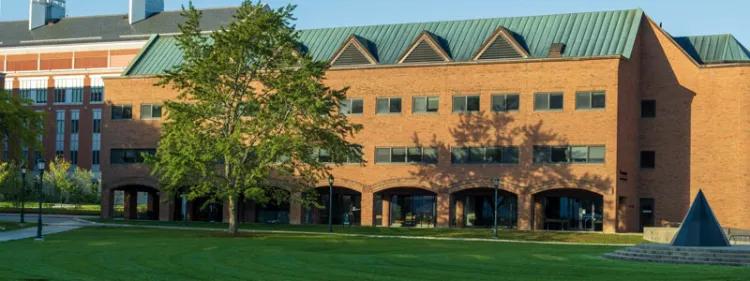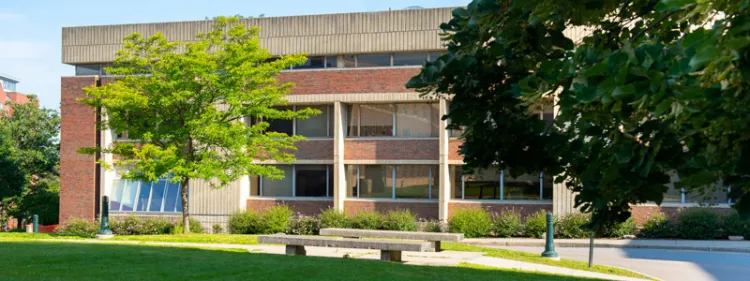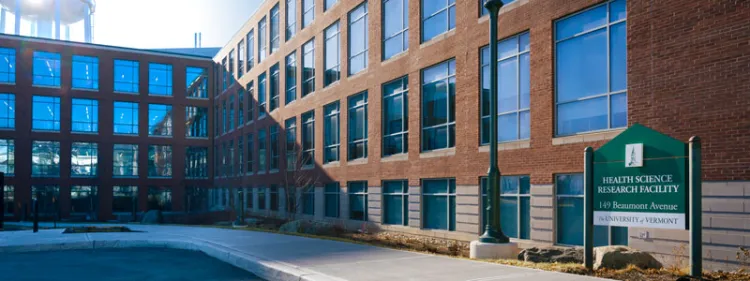UVM’s Center for Biomedical Innovation (CBI) is an internationally recognized hub for design, development, and testing of biomedical devices and systems with a focus on rural healthcare.
The center supports and trains inventors, entrepreneurs, and business leaders who will bring advanced biomedical technologies to the people of Vermont and the world. The CBI brings together students, faculty, and industry through shared programming and an interactive space for applied research, technology development, and education. We offer:
- A place for biomedical companies, researchers, and students to develop new healthcare products and services, with a particular focus on devices and systems that improve health and wellness in rural communities.
- Studio space for team brainstorming, collaboration, and customer focus groups; offices for visiting collaborators from industry
- A prototyping shop and testing lab; and presentation rooms for showcasing new designs and venture ideas.
- A virtual amphitheater where participating on-campus clinicians and researchers in the UVM Medical Center, the Larner College of Medicine, the College of Nursing and Health Sciences, and the Grossman School of Business, as well as off-site industry collaborators and clients can observe the beta testing of new devices and technologies.
- A home for the new vertically integrated biomedical engineering design sequence, which is a cornerstone of the bachelor of science degree in Biomedical Engineering.
Some Current CBI Projects
Our partners in design
College of Engineering and Mathematical Sciences

The B.S. in Biomedical Engineering (BME) trains engineers to work at the intersection of engineering, the biomedical sciences, and healthcare practice. The curriculum establishes core competencies in quantitative engineering methods and biomedical sciences while providing students the freedom to take courses from across the university and apply their knowledge in an innovative four-year design sequence. In this way, UVM BME students develop deep knowledge in areas germane to their professional interests and gain experience by applying that knowledge to design innovative engineering solutions using industry-standard design practices.
The Grossman School of Business

The Grossman School of Business (GSB) offers courses that support the core mission of the CBI, including technology commercialization courses in which teams write commercialization plans for real technologies developed by UVM faculty; courses in social responsibility and business ethics that consider ethical public policy challenges; and marketing courses in product management, new product development, and technology development. The sustainable innovation MBA program provides three-month practicum projects to develop commercial feasibility and business plans for new businesses. GSB students can engage in CBI through internships or work-study projects to apply business expertise to research and products in CBI. GSB faculty work with the NIH-funded ITREP Program, which integrates the Larner College of Medicine and the UVM Office of Technology Commercialization to offer biomedical entrepreneurship resources.
The College of Nursing and Health Sciences

The College of Nursing and Health Sciences supports the development of emerging technologies focused on health behaviors. Courses in behavioral attitudes and health will focus on new technology that enables remote teaching and monitoring of physical activity and fitness compliance in rural areas. CNHS faculty can facilitate the development of new devices used in physical therapy and rehabilitation in partnership with the CBI. The center will benefit from research internships connected to the College’s interprofessional health sciences Ph.D. program with rotations in engineering, medicine, and business.
The Larner College of Medicine

The Larner College of Medicine supports the CBI through clinical trainees spanning the range of medical disciplines as well as graduate programs in Biomedical Engineering, Cellular, Molecular, and Biomedical Sciences, and Clinical and Translational Sciences. The College provides strong supporting biomedical research courses, including microscopy, integrative genomics resources, bioinformatics, biostatistics, flow cytometry, and MRI biomedical imaging. The College’s Center for Health Services Research supports CBI through real-world quantitative health insights.
Contact
Director, Center for Biomedical Innovation
yuri.hudak@uvm.eduMechatronic Systems Design, Medical Technology Development, Biomechanics, Medical Image Analysis Algorithms, Deep Learning
